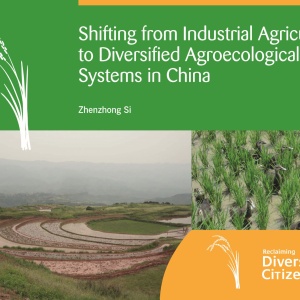
This report from the Centre for Agroecology, Water and Resilience (CAWR) at Coventry University examines how farming in China can move away from a dependence on “industrial agriculture” (defined here as excessive and inefficient use of fertilisers and pesticides) towards agroecological systems (including practices such as lower stocking densities, using manure instead of synthetic fertilisers, growing diverse crops and using soil-building techniques).
According to the report, several factors present barriers to a shift away from industrial agriculture, including:
- An expectation of cheap food (including animal products) among Chinese consumers, particularly among urban workers.
- Framing of agriculture as a means of producing “profitable food commodities” rather than also considering livelihoods and ecosystems.
- A “feed China” narrative that puts most emphasis on the quantity of food produced.
- The concentration of power among multinational agribusinesses.
The report makes a series of recommendations, including:
- Reconceptualise ‘modern agriculture’ in the policy and educational realms.
- Rediscover the value of agroecology in achieving developmental goals.
- Explore opportunities for farmer participatory research and plant breeding.
- Support innovative ways to attract farmers and other people back to the land.
Read the full report, Shifting from Industrial Agriculture to Diversified Agroecological Systems in China, here (PDF link). See also the video Screencast: Agroecology and Sustainable Food Systems (Alexander Wezel) in the Foodsource video library.







Post a new comment »